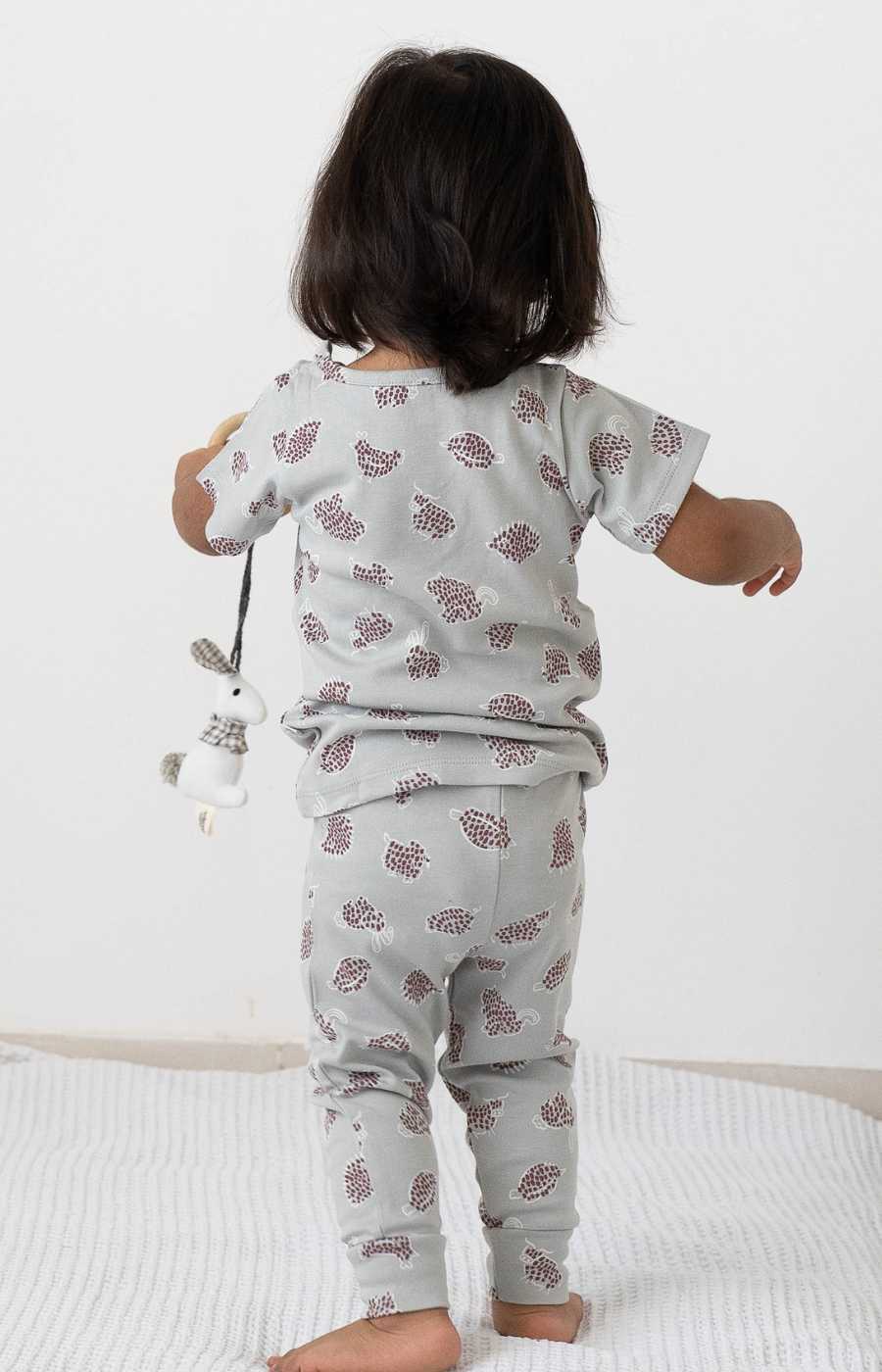Key Takeaways
-
Baby sleep is more than rest. It helps your little one grow, heal, and smile brighter each day.
-
Knowing how much sleep your baby needs can make nights gentler and days easier.
-
Simple, loving bedtime rituals work like magic - swaddles, lullabies, soft night suits, and cuddles.
-
Every sleep regression or restless night is a normal part of this journey.
-
Your calm is your baby’s calm. Be patient, stay close, and let love guide the routine.
-
It’s okay to ask for help. You’re doing beautifully, even on the tough days.
In this article
Understanding Newborn Sleep Patterns: How Much Sleep Do Babies Need?
Baby Sleep Cycles Vs Adult Sleep Cycles
Day Vs Night Confusion: Why It Happens & How To Fix It
9 Expert Tips On How To Help Your Baby Get To Sleep
Baby Sleep Myths Every Parent Should Ignore
Introduction
When your newborn finally snoozes through the night, it's not just a milestone for your little one, but actually a rebirth for you.
This is the start of being able to enjoy the beautiful chaos of parenthood without sleep-deprived tears. From soft midnight coos to the way your little bundle of joy melts into a snuggle with you, this is where priceless memories are made. In this blog, we are going to hand-hold you through the process of making baby sleep dreamy, doable, and very dependable.
No matter if you're battling infant sleep regression or wondering about newborn sleep patterns, we've got you covered.
After all, when baby sleep time gets better, everything gets better.
Why Baby Sleep is Essential?
Without regular, quality infant sleep, your baby's development can miss a beat, and we don't want that!
This is why baby sleep is the true hero of early parenting.
-
Sleep fuels brain growth
During newborn sleep, your baby's brain is buzzing with development, memory, language, and emotional regulation. All of this gets nurtured while your little one snoozes. In fact, how much newborn baby sleep they get can directly support their physical growth, tissue repair, and metabolism.
-
Immunity
Deep infant sleep patterns help reinforce a stronger immune system, which makes your baby better equipped to fight infections and bounce back faster.
-
Mood Regulation
Have you ever dealt with an over-tired and cranky baby? If yes, you must know that proper baby sleep time can help keep the meltdowns at bay, which is good news for everyone in the house!
Understanding Newborn Sleep Patterns: How Much Sleep Do Babies Need?
Sleep does not come with a one-size-fits-all manual, especially in the first year. From catnaps to all-nighters, understanding the recommended sleep duration for infants by age can help you plan better and worry less.
|
Age Range |
Total Baby Sleep Time |
Daytime Naps |
Nighttime Sleep |
|
0–4 months |
14–17 hours |
4–5 naps (short and scattered) |
8–9 hours (interrupted often) |
|
1–6 months |
12–15 hours |
3–4 longer naps |
9–10 hours (starting to consolidate) |
|
6–12 months |
12–14 hours |
2–3 naps |
10–12 hours (more stable nights) |
Baby Sleep Cycles Vs Adult Sleep Cycles
When you're struggling through midnight wake-ups and 20-minute naps, you must try to understand that your baby's sleep cycle is nothing like yours. While adults cycle through deep and light sleep phases every 90 minutes, babies have much shorter sleep cycles, about 40 to 50 minutes. This means they wake up more often and spend more time in lighter stages of sleep, which makes them more sensitive to noise, hunger, and discomfort.

Day Vs Night Confusion: Why It Happens & How To Fix It
If your newborn thinks that 2 AM is playtime, well, their jet-lagged little brains are to be blamed! Kidding!
Day versus night confusion is one of the most common struggles in newborn sleep. This is because your baby was lulled to sleep by your movement during their time in the womb, and night was their wake time. Here are the reasons why it happens and how you can lovingly nudge a shift.-
Baby's circadian rhythm
Your newborn's circadian rhythm isn't fully developed. This is because they don't start producing melatonin until 6-12 weeks [1]. That’s why your baby's sleep time isn't in sync with the clock.
As a pro tip, try exposing your baby to natural daylight during the day. Furthermore, you can dim the lights at night.-
Womb patterns continue to linger
Your baby was rocked to sleep while you moved during the day and stirred when you were still at night.
As a pro tip, you can try to create a consistent nighttime routine using a bath, massage, lullaby, or a cozy baby night suit.-
Overstimulation
If your baby is overtired during the night, they are going to fight sleep. This is going to flip their schedule even more.
As a pro tip, you can start your nighttime winding-down routine a little earlier than usual. Use swaddles or Cocoon Care sleeping pods to give womb comfort to your little one.-
Night feeds
Feeding at night with bright lights and loud sounds can literally wake up your child and make them more alert.
As a pro tip, keep feeds quiet, and dim, and make them as boring as possible. After all, there isn’t much excitement you can (or should) offer at 3 AM. Keep things as calm and uneventful as possible to signal it's still sleep time.9 Expert Tips On How To Help Your Baby Get To Sleep
There is no magic wand for baby sleep. But, there is definitely a swaddle, a white noise machine, and a whole lot of patience. These tips for can come in handy if you want to help your baby sleep longer at night naturally.
1. Create A Peaceful Sleep Environment
Keeping it cool, dark, and quiet is the best tip for setting up a baby-friendly sleep space. You can use blackout curtains, newborn baby sleeping bags, baby blankets, a humidifier, and a soft white noise machine to recreate the cosy calm of your womb.
2. Try Swaddling
Swaddling can mimic the snugness of the womb and reduce the startle reflex[2]. Swaddling infants is a simple and effective way to get them to sleep. To that end, you can use Cocoon Care’s muslin swaddles that are three times softer, lighter, and more breathable than cotton.
3. Let Your Kid Self-Soothe
It's absolutely okay if you let your little one fuss for a while before falling asleep. Just stay close, but encourage them to learn the art of drifting off on their own; one little step at a time.
4. Take Naps Seriously
Skipping daytime naps is the perfect recipe for making your baby overtired and cranky. Consequently, a terrible night's sleep awaits you and your little one. Prioritise daytime infant nap patterns to protect nighttime rest.
5. Lower The Temperature
Babies can sleep best at 24 to 26 degrees Celsius. If the temperature is too hot, they are going to get sweaty and cranky. Use breathable infant night suits to keep your baby snug while keeping your room cool with a fan or AC for a baby’s sound sleep.
6. Get Ready For Quick Diaper Changes & Crib Sheets
Always keep extra crib sheets and nappies for the baby nearby. Midnight blowouts are very real and they can ruin sleep for everyone.
7. Use A Pacifier Trick
To help your baby learn to self-soothe between feeds, using a pacifier can be a very healthy trick. You can start using it once the feeding schedule is established.
8. Develop A Bedtime Routine
Start your baby’s bedtime routine every day at the same time. Studies have found that consistent bedtime routines can reduce sleep problems[3]. You can experiment with lullabies, cozy sleepsuits for newborns, massages, and other things that help calm your baby down. Mama, remember, babies love predictability!
9. Stay Calm & Patient - Don’t Overthink
Mama, your baby is going to sleep eventually. And the more calm you are, the better your baby is going to be.
Norah O’Donnell (American journalist) said: “Sleep when the baby sleeps. Housework can wait. Emails can wait. But your health and sanity can’t.”

Common Baby Sleep Problems
This is not a problem, Mama. It is just a phase. And like all phases, this too shall pass. Your baby's sleep is not broken. It's just evolving. Let us try to understand why babies wake frequently during the night;
1. Frequent night waking
This is the biggest one. Babies break their newborn sleep patterns to feed, be soothed, or just check that you are still there. To handle this situation, you must stick to a consistent bedtime routine. Every time your baby makes a sound, don't rush in to hold them up. Be there, give gentle reassurances as they're still learning to self-placate.
2. Short naps
A 20-minute catnap is totally normal for newborns. Their infant sleep cycles are not just short but also light. You can use white noise, swaddling, or make the room dark to extend nap time. Skipping nap time is only going to make your baby more cranky.
3. Early morning wakeups
When your baby wakes up at 4 or 5 am, it is often linked to light exposure or overtiredness. Early bedtime and a full belly before bedtime can help you manage this situation.
4. Sleep regression at 4, 6, 8, and 12 months
Sleep regression can happen during growth spurts and other developmental leaps. Sticking to your routine is all you need to do to manage these baby sleep regression milestones. The regression is only temporary and it will all pass. Although we know that it's difficult to feel that way at 2 am in the morning.
5. Teething, illness, and travel disruptions
Disruptions can happen. Teething pain, cold symptoms, or a different environment can wreak havoc on a baby's sleep time. For babies, comfort comes first. Therefore, do not try to use any aggressive method to sleep train your child. Gentle and consistent routines are going to work just fine.
Baby Sleep Myths Every Parent Should Ignore
As new parents, you’ll hear a lot of well-meaning advice. But not everything you hear is true, especially when it comes to baby sleep. These common myths often create more confusion than comfort. Let’s debunk common misconceptions about baby sleep with love and logic.
“Keep the baby awake during the day. They’ll sleep better at night.”
This sounds reasonable, but it doesn’t work for little ones. An overtired baby is more likely to be fussy, restless, and harder to settle. Well-timed naps actually help babies sleep better at night. If you're wondering whether it’s okay to wake a sleeping baby, read our blog on why waking up a baby sometimes makes sense.
“Start solids early to help your baby sleep longer.”
Many people say this with the best intentions, but introducing solids before your baby is ready can lead to tummy discomfort and disturbed sleep. Baby’s sleep is connected to feeding, but it’s not about just filling the tummy.
“If your baby is crying, something must be wrong.”
Crying is your baby’s way of expressing many things, not always distress. It could be a transition between sleep cycles, general tiredness, or just seeking comfort. Still, if something feels off, trust your instinct. There could also be medical reasons why babies struggle to sleep.
“You have to sleep train to build good sleep habits.”
There is no single path to restful nights. Some families use sleep training, while others follow a more intuitive rhythm. Both are okay. The key is to find what feels right for you and your baby. Explore different sleep training options.
What Was The Biggest Sleep Challenge You Had As A New Parent? Real Challenges & Advice From First-Time Moms & Dads
Take a look at some real-life newborn sleep struggles from new parents and how they tackled some of the most common baby sleep problems.
Megha, Mumbai, Mother Of A 2 Month Old Daughter
Challenge; My baby slept through the day and then stayed up all night.
Advice: Correcting a newborn’s reversed sleep cycle was difficult, but exposure to daytime sunlight and a consistent cosy bedtime routine helped fix this.
Prashant, Pune, Dad Of A 6 Month Old Daughter
Challenge; Teething pain messed up my son's entire sleep routine.
Advice; We used cold teethers before bed and stuck to our same bedtime rituals.
Naveen, Jalandhar, Dad Of A 3 Month Old Son
Challenge; One of my greatest struggles with baby sleep was when my child used to wake up after every 45 minutes at night.
Advice; White noise and helping my child self-soothe for at least 5 minutes helped with this situation tremendously.
Final Thought
Every baby is different, and so is every sleep journey. Some nights feel endless, and some bring sweet surprises. What helps most is staying consistent, calm, and connected. Swaddles that soothe, sleeping bags that breathe, rompers that cuddle, all these small comforts can make bedtime easier for both of you. You can find gentle, thoughtfully made baby clothes online in India at Cocoon Care that support your baby’s sleep and your peace of mind.
References:
[1] Kennaway, D. J., Stamp, G. E., & Goble, F. C. (1992). Development of melatonin production in infants and the impact of prematurity. The Journal of clinical endocrinology and metabolism, 75(2), 367–369. https://doi.org/10.1210/jcem.75.2.1639937
[2] Dixley, A., & Ball, H. L. (2022). The effect of swaddling on infant sleep and arousal: A systematic review and narrative synthesis. Frontiers in pediatrics, 10, 1000180. https://doi.org/10.3389/fped.2022.1000180
[3] Dixley, A., & Ball, H. L. (2022). The effect of swaddling on infant sleep and arousal: A systematic review and narrative synthesis. Frontiers in pediatrics, 10, 1000180. https://doi.org/10.3389/fped.2022.1000180
FAQs On Baby Sleep
1. How many hours should a baby sleep by age?
You can check out our table on recommended sleep duration for infants by age. Newborns need up to 17 hours of sleep, and the number gradually reduces as they grow.
2. When should I start a bedtime routine for my baby?
You can start it as early as 6 to 8 weeks. The bedtime ritual should be short, simple, and consistent.
3. Why does my baby wake up every hour at night?
Frequent baby night wakings are a very common infant sleep pattern. Your baby might be waking up due to hunger, sleep depression, or overstimulation.
4. How do I get my baby to sleep through the night?
If you want to know how to make your baby sleep longer, try to have a consistent and predictable nighttime routine. Use white noise and beautiful infant nightwear. These newborn sleep rituals will help your child consolidate baby sleep time naturally over time.
5. What are common baby sleep regressions and how long do they last?
Baby sleep regressions normally happen around 4, 6, 8, and 12 months due to developmental milestones. The disruptions in infant sleep can last up to 6 weeks. At this time, it is important for you to stay calm and do your best to maintain your baby's sleep routine.
6. How do I create a safe and calming sleep environment for my baby?
You can follow these tips for setting up a baby-friendly sleep space to enhance infant sleep quality and duration. Use swaddles, cozy baby blankets, and breathable sleeping bags to keep your baby snug and comfortable. Furthermore, keep the room dark and cool (24-26 degree Celsius). You can also use a white noise machine to drown any external sounds.
7. Is it normal for my baby to fight naps?
While it is normal for your baby to fight naps, skipped naps can actually disrupt the baby's sleep time and lead to crankiness and overtiredness. Try to stick to nap schedules and look for the baby's sleep readiness cues.
8. What is a wake window and how does it affect baby sleep?
The wake window is the optimal time a baby can stay awake before needing to sleep. Ignoring the wake window or overriding it can lead to overtiredness and disruption of an infant's sleep routine.
9. How can I fix day-night confusion in newborns?
To correct a newborn's reversed sleep cycle, try exposing a child to daylight during the day and keep the room dim at night or dark at night. Using comfortable baby nightsuits, white noise and predictable sleep time rituals can help align the baby's sleep time with the natural clock.
10. When do babies start sleeping longer at night?
Babies start stretching their infant sleep by three to six months. You can support this with cozy sleepsuits for newborns, a quiet environment, and a soothing wind-down routine. The practice of helping your baby sleep longer at night starts with consistency.
11. How do I calm an overtired baby before bedtime?
Soothing touches, swaddling, and sticking to a predictable baby sleep routine can work wonders. An overtired newborn's sleep can be harder; therefore, using calming cues can calm them down and help them sleep better.
12. What are the signs that my baby is ready for a nap or bedtime?
Look for infant sleep cues like yawning, eye rubbing, fussiness, or a loss of interest in play. When parents are able to recognize sleep readiness cues, it helps them time their child's naps better and keep overtired crankiness at bay.
13. What’s the ideal room temperature for baby sleep?
The ideal temperature for baby sleep time is 20-22°C. If your room is too hot or cold, it can cause frequent baby night waking.
With Love, from Cocoon Care
Dear Parent,
No matter where you are, your baby deserves gentle beginnings and comforting care. At Cocooncare, we pour love into every stitch. From soft muslin baby swaddles to cozy sleep pods and thoughtfully made newborn clothing, our essentials hold your baby with the same tenderness as you do. You can find baby essentials on our website and also on Amazon, Firstcry, Myntra, Nykaafashion and DuckDuck baby.
Because every baby deserves to be cocooned in care.
About the Author: The Cocoon Care Editorial Team works with pediatric consultants and experienced parents to bring you baby care tips you can trust.
Popular Searches
Baby Clothing | Swaddle | Baby Bibs | Mittens For Baby | Night Dress Baby | Baby Sleep Sack | Babies Blankets | Bottom Wear | Baby Romper | Baby Gift Set | Sleep Essentials | Burp Cloths | Nappy For Baby | Hooded Baby Towel



















